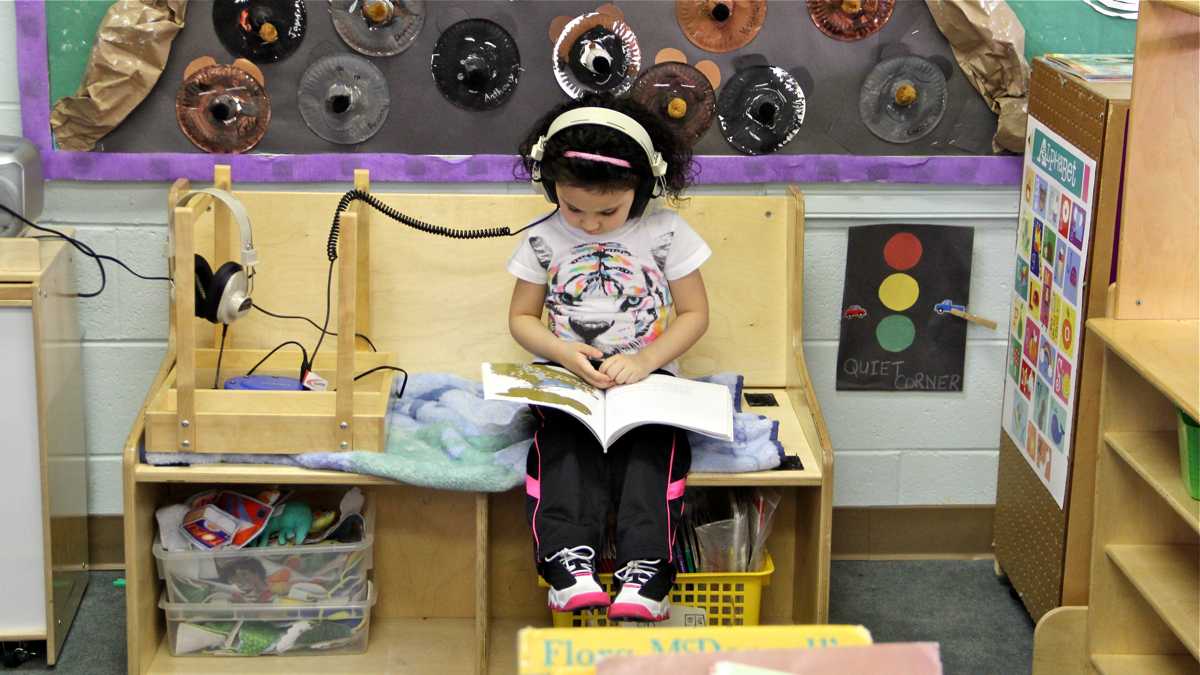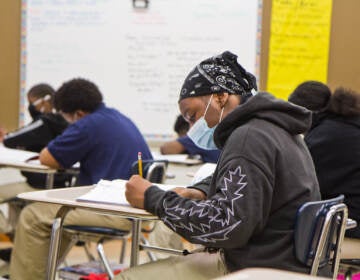Philly school district kicks off $30 million push for early literacy

Kylee Mendez reads while she listens in her 4-year-old class at FELS Paley Center in North Philadelphia in this March, 2015, file photo. (Emma Lee/WHYY)
Close to 700 K-3 teachers from 40 District schools are attending a weeklong summer institute at Martin Luther King High School in East Germantown, learning best practices for teaching students how to read.
The professional development session is a kickoff of a three-year, $30 million effort on the part of the District to bolster the number of students in city schools who read proficiently by the age of 8, a marker that is highly predictive of future success in school. Now, only 40 percent of students in District schools reach that level.
The William Penn Foundation has given $6 million and the Lenfest Foundation $4.5 million to the effort, which is one component of the citywide READ! by 4th initiative launched last year.
In addition, the Fund for the School District of Philadelphia will raise money to match nearly $3.4 million of the grant, bringing the philanthropic total to just under $15 million. The District will contribute the rest of the money, most of which will provide literacy materials to classrooms.
Eventually, the project will reach 2,000 teachers and 48,000 students in 150 city elementary schools, said Diane Castelbuono, the District’s deputy chief for early childhood education.
The schools participating this year will get a full-time literacy coach and expanded classroom libraries. The literacy coach will work with principals and model best practices for teachers in the classroom, helping them recognize individual student needs. The libraries will be geared to the ability levels of students in each classroom, and students will be able to take the books home.
Schools had to apply to be in the first cohort and promise that at least 65 percent of their K-3 teachers would attend the summer institute, which includes 14 different workshops and keynote speeches by nationally known literacy experts.
A total of 77 schools applied; the District prioritized those with the lowest 3rd grade reading scores and sought geographic balance, Castelbuono said.
“The interest was high,” she said. “Schools that didn’t get in will do it next year.”
At the institute, teachers attend the sessions in school blocs, and have time at the end of each day to discuss what they have learned.
Topics of the workshops range from phonics and phonemic awareness to how to engage familes in reading, strategies to maximize reading-aloud time in class, how to best use guided reading, the importance of establishing classroom routines and creating a literacy-rich environment, working with English language learners, developing writers, and supporting literacy for students with disabilities.
All participants – which include grade, special education and ESOL teachers, counselors, and the principal – must attend all the sessions, even if they don’t usually work with English language learners or students with dyslexia or other learning challenges. Strategies for use with those students can often be applied to other students, Castelbuono said.
“There is a science to effective literacy instruction,” said Castelbuono. “And there is no better way to make sure that kids become proficient readers and writers than to make sure they have a highly skilled, highly trained, and highly supported teacher in front of them. And that’s what this is about.”
Elliot Weinbaum, program director for education at William Penn, says the foundation has faith the funding will be well spent. He observed that when the District had a specific focus on early literacy in the late 1990s, it saw early reading proficiency grow by 17 points over five years.
Duplicating that level of success would still not get the District to where it needs to be, but the experience demonstrated “that we can make improvement when those resources and supports are in place,” Weinbaum said.
Anna D’Angelo, an ESOL teacher at Cramp Elementary School in Kensington, said that she had been looking forward to the week. “I hope to be exposed to quality children’s literature that I can take back and use for reading and writing and collaborate more with my colleagues,” she said.
Not all of the students at Cramp are classified as ESOL, but most come from families in which Spanish is the dominant language, she said.
D’Angelo said parents are very interested in helping their children but not confident in their own English. She gives students homework in both languages, she said, so parents will feel they can help.
“I think that one thing people don’t really know is that our children try very hard,” she said. D’Angelo said she was especially excited about getting more books for them that they can read in school and take home.
Monday’s keynote speaker was Carol Jago, former president of the National Council of Teacher of English and author of several books on literacy. She was interactive, putting poems and children’s books on the projector, reading aloud, and asked teachers questions about themes they would bring up in the classroom.
“Education isn’t something we do to kids,” said Jago. “It’s a journey in which we take them with us.”
WHYY is your source for fact-based, in-depth journalism and information. As a nonprofit organization, we rely on financial support from readers like you. Please give today.




